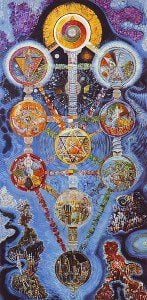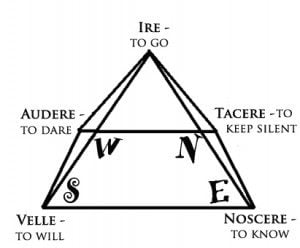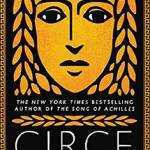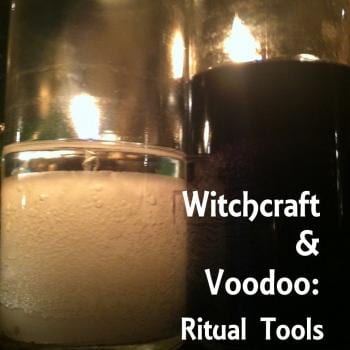
Knowledge, Wisdom and Gnosis – What do these words mean to you? How do you express these principles in your spiritual work? Is any one more important than the other? Why?
I was excited by this week’s Pagan Experience topic because I see these three attributes as the three poles, not of Paganism in particular, but faith in general. I’ve been talking about this recently. What defines “Pagan theology?” Do we even have such a thing? What are the differences between Knowledge, Wisdom and Gnosis, and how do they affect our spiritual practice?
The Logos and the Sophia
The definitions of Knowledge given by a dictionary have the connotation of education. One studies and learns in order to obtain knowledge. One trains or reads things. When one is arguing from Knowledge, one argues from a place of reason and cause and effect.
Knowledge gives context within a vaster framework. It is the Logos, the Word. Knowledge gives things forms and names them. The power of naming was one of the great abilities attributed to great wizards, druids, and significant religious figures such as saints.
The definitions of Wisdom that a dictionary presents to us also include scholarly learning, but mostly they have connotations of insight and discernment. Wisdom is learned through the School of Hard Knocks and is the result of struggle and mistakes. When one is arguing from Wisdom, one argues from a place of folk tradition, intuition and common sense.
Wisdom gives acuteness of judgment. It is the Sophia, the innate knowing that we have and aren’t aware of. This is the power attributed to the great seers, oracles and Biblical judges.
In a study of the Kabbalistic Tree of Life we also see the manifestation of these powers. The Sephiroth Chokmah represents Wisdom, and is seen as being another expression of the Sophia in Abrahamic religious thought. The Sephiroth Binah, usually translated as “Understanding,” represents “processed wisdom,” or wisdom seen through the lens of learning, study, and deductive reasoning. Chokma crowns the Pillar of Mercy; Binah crowns the Pillar of Severity.
Interestingly, the Logos is seen as masculine and the Sophia as feminine; while Chokmah is seen as male, giving its seed to Binah, through which the worlds are birthed; which, I suppose, illustrates the fluidity of gender-based metaphors and how greatly they depend upon culture and perspective.
Why does all of this matter? It matters because the works of the Greek philosophers, who conceived of the Logos and the Sophia, is the beginning of modern philosophical and theological discourse, and that idea continues to influence the way we think about Knowledge and Wisdom. The Sephiroth matter because the mystical Kabbalah is one of the essential concepts of occultism; which of course strongly influences the modern Neo-Pagan movement.
Gnosis: Following Your Bliss
So where does Gnosis fall then? Our dictionaries would translate it, again, as “knowledge,” only this is spiritual or revealed knowledge, direct from the divine. The Druids would have called it “Awen,” or “fire in the head,” which is the same wisdom that inspires prophecy and art. This is where the Gnostic concept of the Sophia comes in, which again, influences modern occultism, this time through our heritage of Alchemy. Expressing Gnosis might also be understood in more modern language as “speaking your truth” or “following your bliss.”
The Gnostic Sophia was the part of the Divine that exists within all of us; the Divine Spark. Aleister Crowley spoke of it when he said that “every man and every woman is a star.” Jewish mysticism calls it the Shekinah; Christianity understands it as the Holy Ghost; which shakes up the triumvirate a bit, as they understand Jesus to be the Logos and God the Father as the Unknowable All. Therefore, I can’t place Gnosis neatly at the top of the Pillar of Mildness, a.k.a. the Middle Pillar, in Kabbalistic symbolism, but when you look at the totality of what the Middle Pillar represents, Gnosis would suit it quite well. It’s a direct path of information from the Divine without and within, and it strongly suggests the need for balance. When Crowley spoke of the coming of the child of the Aeon, he was referring to a being of Gnosis who was a perfect synthesis of binaries that manifest as something new; the Divine Androgyne, light and dark, mortal and divine; and he was not speaking of a Messianic being, but rather, of finding the Messiah within oneself.
The discourse in the blogosphere often addresses UPG (Unverified Personal Gnosis,) and from this dialogue one might get the impression that gods chatting with you in your living room is what Gnosis means. But in my understanding it’s usually much more ordinary than that. This is the guidance of the Divine, the little “voice” that tells you when something is right or wrong. It can manifest as gods chatting with you in your living room, but more often it comes in the form of sudden realizations and connections: “This relationship is over,” or “I need to spend my life creating music,” or “This witchcraft stuff feels so right to me; it’s like coming home.” Sometimes it can be difficult to determine where Wisdom ends and Gnosis begins.
Other Ways of Looking at the Triumvirate

In more specifically Pagan triads, one might look to the Fates. Clotho, who spins the threads of life from the raw dross of chaos, is Gnosis; Lachesis, who weaves the threads into the great tapestry of Creation is Knowledge (the Logos); and Atropos, who cuts the threads of life when they need to be cut, is Wisdom (the Sophia). Or one might understand them as Urðr (Wisdom of what has happened,) Verðandi (Gnosis of what is happening now,) and Skuld (Knowledge that allows us to make an educated guess about what will happen in the future).
One might also look to the Witches’ Pyramid. Air (Noscere) is “to Know,” and that’s the starting point, which is where one integrates Knowledge. Fire (Velle) is “to Will,” in the context of “True Will,” and this is the point at which one integrates Gnosis. Water (Audere) is “to Dare,” and this is the point at which we integrate Wisdom, which puts Knowledge and Will into practical application. Earth (Tacere) is “to Keep Silent,” and this is how the experience is integrated into our spirit.
One might also look to psychology. Knowledge is centered in the ego, the conscious part of ourselves that we think of as Self. Wisdom is centered in the subconscious, our accumulation of intuition and all the things we don’t know that we know. Gnosis is the superconscious or Higher Self; again, that part of us which is part of the divine, or that part of us which speaks for that which is greater than just ourselves.
This may sound a little weird, but one of the most effective ways I found to grasp this concept came from a roleplaying game called Werewolf: the Apocalypse, which I discovered in my late teens. They had a concept of the forces that created everything and it was a divine triad. The Wyld was the spark of raw chaos that brought everything into being with the raw power of potential, and it was bright and random and beautiful and quixotic and dangerous; this, to me, would be Gnosis. The Weaver was all about classification and organization and it gave the universe form and function; this, to me, would be Knowledge. And the Wyrm was the force of destruction that cleared the way for new things to grow; this, to me, would be Wisdom.
Balancing the Forces
I believe that it’s important to express a balance of these three types of “knowing” in one’s spirituality and philosophy, and that the roots of modern Paganism encourage us to do that. These terms have specific and defined meanings within Christian theological discourse. But part of the problem we’re running into is that within the Pagan discourse is that we are possibly not saying the same thing when we use the words.
One of my mentors, Sam Wagar, said something once to me that I thought was very profound about the different roles of clergy; I’m not sure if he read it somewhere else or if he came up with it on his own. Essentially there are three types of clergy in any sort of religious setting; Rabbis, Priests and Monks (and Nuns); or as I would call them, Mystics. Rabbis are concerned with Knowledge: doctrine and lore, ritual and interpretation; Priests are concerned with Wisdom: which is ministering to the needs and lives of the people who share their faith, and Mystics are concerned with Gnosis: or rather, their personal relationship with deity and the divine.
All of these aspects serve an important purpose in the practice of faith, and especially in the various roles of people dedicated to divine service as their primary focus. In Abrahamic religions a person devoted to Knowledge would be a scholar of the printed doctrine, such as Talmud, the Koran or the Bible. In Paganism, a person devoted to Knowledge is likely a scholar of magickal study and technique, a student of history or theology in a Reconstructionist tradition, or a Pagan philosopher. In Abrahamic religions a person devoted to Wisdom would be a priest, imam or rabbi who spends his life in service to the community. This person runs soup kitchens or teaches school or does prison ministry and hospital chaplaincy. Pagans with a Wisdom focus also do prison ministry and hospital chaplaincy, run public rituals or sanctuaries, join umbrella groups, develop into healer-shamans or diviners, or become Local Coordinators for Pagan Pride. Abrahamics with a focus on Gnosis become monks or nuns, hermits or Sufi mystics or whirling dervishes, and sometimes the faithful priest who quietly spends his life building a cathedral, synagogue or mosque because that’s what God wanted him to do. Pagans with a Gnosis focus become bards, seers, shamans, channels and hedgewitches.
I also believe that too much of any one thing leads to problems. Abrahamics who are too focused on Knowledge lecture endlessly on minutia of scripture; Pagans too focused on Knowledge spend hours clogging email lists and blog comment sections discussing the minutia of whether or not Gerald Gardner spun people to the right or the left in initiation ceremonies, or whether or not the MacLeods were given the Faerie Flag or stole it; I mean, seriously, in the context of religion, who really cares? Religious people focused too heavily on Wisdom become pedantic busybodies who take charge of everything and tell everyone else how to live their lives. Religious people too focused on Gnosis tell everyone else about the will of their gods, complain when someone else chooses to worship differently, and sometimes tip over what we would consider “the deep end.”
I think it’s interesting that John Beckett recently wrote about this aspect, and he framed the dialogue as a binary between UPG and the Lore; which he then argued did not exist. I think he’s got a lot of good things to say there. I believe that people do think of it a a binary. But it really isn’t. These aspects have a natural interplay; indeed, they often (and should) overlap.
He makes a valid point that Gnosis tends to be the least respected way of knowing in our culture:
Our Protestant overculture also tells us that people who talk to Gods are crazy. Sometimes this refers to the fact that mystics and God-speakers have a rather different take on reality than the mainstream. But it also refers to the fact that some people who claim to speak with Gods are genuinely mentally ill.
This makes discernment a messy affair – how do we separate the true messages from the Gods from those who are controlled by disease… and from those who claim to speak with Gods to pump up their own egos? It’s much easier to just quote the lore and smack them down. Unfortunately, that also means we ignore genuine wisdom from the Gods, and we make it less likely that we ourselves will experience Them first hand.
I agree with John’s observation that Gnosis is the heart and soul of faith. We have Knowledge, however, to help us to understand its revelations and give it a framework that makes sense. And we need Wisdom to sift through the revelations of Gnosis and find the parts which are of practical benefit in our daily lives and which are not.
Unchecked, Gnosis can lead us into undesirable situations. Gnosis might tell me to sell everything I own and move to Tibet, but is that really a good idea? Maybe I should consider that a little first before leaping into it.
However, many people discount the feelings that they glean from Gnosis because Knowledge is contradictory to that inner knowing. For example, many modern Pagans who follow Loki associate Him with foxes. There is no historical basis for Loki to be associated with foxes; it doesn’t appear in the Lore anywhere. However, quite a few modern worshipers have made this connection, and Wisdom would back this up by telling us that since foxes carry a connotation of cleverness and mischief in our Anglo-influenced culture it would be logical to conflate the two; at least in our current understanding of what Loki represents. Whether you believe that deities are ideas or individuals with agency, in either case They likely don’t stay the same over hundreds of years, and relying too much on Knowledge carries the risk of becoming static and hidebound.
And from a third viewpoint, the shadow-side of Wisdom is arrogance and hubris. If your cup is already full there’s no room for more wine in it. Thinking of yourself as wise puts you at risk of being a know-it-all. Wisdom can also limit the benefits of the spark of inspiration that is Gnosis in your life or even prevent it from manifesting its changes at all. How many of us stay in boring, unfulfilling jobs that we hate or loveless marriages due to Wisdom? How many of us never take the risks that are needed to realize our dreams or embrace our inspiration?
Application to My Own Practice
So to get back to the original question, on a personal level I try to leave space for all three ways of knowing in my spiritual practice. Exactly what form this takes depends greatly on the situation. When I learn a piece of relevant information (Knowledge) I consider how this might apply to my own active practice and present life (Wisdom) and test it against the sense of whether or not it feels “right” to me (Gnosis). When I am confronted by a situation that demands Wisdom, I check what I think I know against the available information and my own experience (Knowledge) and try to leave room for the spark of inspiration (Gnosis.) When I am inspired by the gods or the Muses (Gnosis,) I refer back to my own experience and what I have learned and studied (Knowledge) and then sprinkle it with a liberal dose of what I hope to be practical common sense (Wisdom). I’ve not always been the best at it, and I think I’ve developed a bias in all three directions at one point or another in my life.
I think one of the most effect things I do to aspire to a balance is to read authors who lean in all three directions to consider my practice and my theology; which of course is a method of acquiring Knowledge about all three aspects. John Halstead often argues from a place of Knowledge; Jason Mankey from a place of Wisdom, and Nornoriel Lokason from a place of Gnosis. And I value the insights of all three.
I work as a Tarot reader at a local bookstore and I help to “minister” to a local Pagan group by officiating at passage rites. This helps me to do the work of Wisdom without getting too involved in it; which I was when I was running my metaphysical store.
I have to work to make time for it, but I also make an effort to spend time in nature and ritual, and observe a personal ecstatic practice. I also make time for my art and my writing. And this allows me to embrace my Gnosis and “follow my bliss.”
I am sure my solutions are not practical for everyone, but they work for me. In any case, I hope I have made a case that there is room for all of them, both in personal practice, and in the Big Tent of Paganism. Indeed, I think we need them.

















